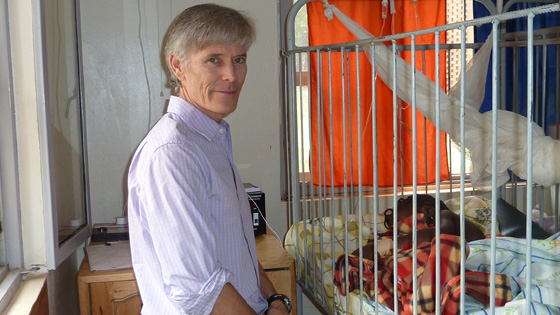
Dr. Kevin Kain in a four-bed ICU in Uganda for which he and his students raised $45,000. Dr. Kain and researchers conduct studies of new diagnostics and therapies for life-threatening infections in the ICU. (Photo: Dr. Andrea Conroy, former graduate student of Dr. Kain, now a scientist at Indiana University.)
TGRI researcher Kevin Kain is gaining new insights about children's brains from studying how infection in pregnant women affects their offspring.
Focusing on malaria, which affects 125 million pregnant women world-wide every year, Dr. Kain has shown profound consequences of maternal illness on fetal health. These include an increased risk of pre-term birth, stillbirth and low birth weight infants.
In a study published today in
PLOS Pathogens, he demonstrated for the first time that mice exposed to malaria in pregnancy have impaired learning, memory and depressive-like behaviours. The mice themselves were not infected with malaria.
These implications are far-reaching, emphasizes Dr. Kain, suggesting that exposure to malaria in a mother's uterus can derail early brain development which could impact learning in children for the rest of their lives.
"We're just learning how critical the in utero environment is for developing babies," he says. "If a mother is exposed to an inflammatory event or infection such as malaria, it can alter the path of her child's life."
"We have to do a better job of protecting these developing brains. Inequity starts in utero."
Dr. Kain, who is also Science Director, Tropical Disease Unit at TGH, and a Professor of Medicine at the University of Toronto, was able to show in his previous mouse studies that a mother's malaria alters how blood vessels develop in the placenta.
He identified a specific signalling pathway in the complement cascade, which is activated by infection, and impairs vascular development in the placenta. The placenta provides oxygen and nutrients to the baby through the mother's blood supply.
This pathway can be targeted with drugs already approved and in use to help prevent birth abnormalities. Dr. Kain is now following 450 mother and child pairs in Malawi to test whether a simple and inexpensive amino acid given to pregnant women can ensure normal vascular development in the placenta and fetus, leading to normal births and preventing developmental delays.
"We know that malaria triggers pre-term birth," he says. "If we can understand that mechanism, perhaps then we can understand generally how and what triggers poor birth outcomes all over the world. What we learn in a low-resource setting could also be applied to our high-resource North American challenges."
